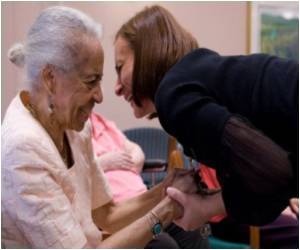New research indicates that when a person with mild cognitive impairment is agitated or restless, caregivers can expect to find they are more nervous and edgy.

Mild cognitive impairment (MCI), a transitional stage between normal age-related cognitive changes and early stages of Alzheimer's disease, is characterized by changes in memory that may not interfere with everyday activities but can cause frustration and anxiety among persons with the impairment and their family members.
Results of the team's research, reported in the November Journals of Gerontology Series B: Psychological Sciences and Social Sciences, particularly note the involvement of rising cortisol levels in caregiver samples. Cortisol is a hormone produced by the body as the outside stress it is subjected to increases.
"Providing support for a relative encountering cognitive difficulties often requires significant changes in everyday roles and responsibilities," said lead author Tina Savla (http://www.humandevelopment.vt.edu/savla.html), assistant professor of human development in the College of Liberal Arts and Human Sciences. "These changes take a toll on family relationships and psychological health, and carry consequences for the care partner's physical health."
According to Savla, "Dealing with the day-to-day issues of living with a person with MCI can allow little time for recovery and may tax one's hypothalamic-pituitary-adrenal (HPA) system. The dysregulation in this system likely contributes to illnesses by further distressing the cardiovascular, metabolic, and immune functions."
In order to compile study data, Savla's team made phone calls to 30 spouse care partners on seven consecutive days to find out how their time had been spent that day, interactions with their spouse and other family members, and their mood as well as their spouse's mood and behavior throughout the day. Saliva samples were also collected from the caregivers on four study days to measure cortisol levels.
Advertisement
Difficulties and reactions reported during the daily inter¬views were confirmed by assaying saliva for cortisol, a stress-related hormone. Savla suggests that caregivers "are having stress reactions that may put them at greater risk for physical health problems." Her research team found elevated cortisol levels throughout the day with a slower rate of decline, typically linked with other diseases.
Advertisement
Source-Eurekalert










